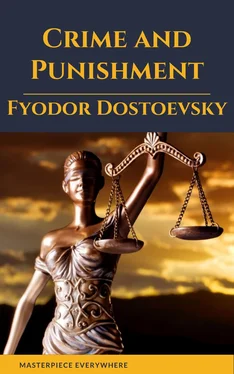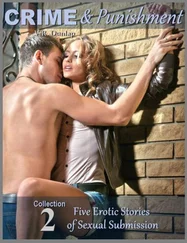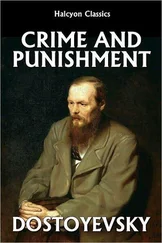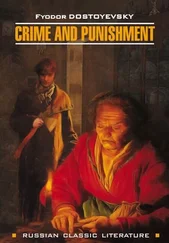He went up to Razumihin's room on the fifth floor.
The latter was at home in his garret, busily writing at the moment, and he opened the door himself. It was four months since they had seen each other. Razumihin was sitting in a ragged dressing-gown, with slippers on his bare feet, unkempt, unshaven and unwashed. His face showed surprise.
"Is it you?" he cried. He looked his comrade up and down; then after a brief pause, he whistled. "As hard up as all that! Why, brother, you've cut me out!" he added, looking at Raskolnikov's rags. "Come sit down, you are tired, I'll be bound."
And when he had sunk down on the American leather sofa, which was in even worse condition than his own, Razumihin saw at once that his visitor was ill.
"Why, you are seriously ill, do you know that?" He began feeling his pulse. Raskolnikov pulled away his hand.
"Never mind," he said, "I have come for this: I have no lessons… . I wanted, … but I don't really want lessons… ."
"But I say! You are delirious, you know!" Razumihin observed, watching him carefully.
"No, I am not."
Raskolnikov got up from the sofa. As he had mounted the stairs to Razumihin's, he had not realised that he would be meeting his friend face to face. Now, in a flash, he knew, that what he was least of all disposed for at that moment was to be face to face with anyone in the wide world. His spleen rose within him. He almost choked with rage at himself as soon as he crossed Razumihin's threshold.
"Good-bye," he said abruptly, and walked to the door.
"Stop, stop! You queer fish."
"I don't want to," said the other, again pulling away his hand.
"Then why the devil have you come? Are you mad, or what? Why, this is … almost insulting! I won't let you go like that."
"Well, then, I came to you because I know no one but you who could help … to begin … because you are kinder than anyone— cleverer, I mean, and can judge … and now I see that I want nothing. Do you hear? Nothing at all … no one's services … no one's sympathy. I am by myself … alone. Come, that's enough. Leave me alone."
"Stay a minute, you sweep! You are a perfect madman. As you like for all I care. I have no lessons, do you see, and I don't care about that, but there's a bookseller, Heruvimov—and he takes the place of a lesson. I would not exchange him for five lessons. He's doing publishing of a kind, and issuing natural science manuals and what a circulation they have! The very titles are worth the money! You always maintained that I was a fool, but by Jove, my boy, there are greater fools than I am! Now he is setting up for being advanced, not that he has an inkling of anything, but, of course, I encourage him. Here are two signatures of the German text—in my opinion, the crudest charlatanism; it discusses the question, 'Is woman a human being?' And, of course, triumphantly proves that she is. Heruvimov is going to bring out this work as a contribution to the woman question; I am translating it; he will expand these two and a half signatures into six, we shall make up a gorgeous title half a page long and bring it out at half a rouble. It will do! He pays me six roubles the signature, it works out to about fifteen roubles for the job, and I've had six already in advance. When we have finished this, we are going to begin a translation about whales, and then some of the dullest scandals out of the second part of Les Confessions we have marked for translation; somebody has told Heruvimov, that Rousseau was a kind of Radishchev. You may be sure I don't contradict him, hang him! Well, would you like to do the second signature of 'Is woman a human being?' If you would, take the German and pens and paper—all those are provided, and take three roubles; for as I have had six roubles in advance on the whole thing, three roubles come to you for your share. And when you have finished the signature there will be another three roubles for you. And please don't think I am doing you a service; quite the contrary, as soon as you came in, I saw how you could help me; to begin with, I am weak in spelling, and secondly, I am sometimes utterly adrift in German, so that I make it up as I go along for the most part. The only comfort is, that it's bound to be a change for the better. Though who can tell, maybe it's sometimes for the worse. Will you take it?"
Raskolnikov took the German sheets in silence, took the three roubles and without a word went out. Razumihin gazed after him in astonishment. But when Raskolnikov was in the next street, he turned back, mounted the stairs to Razumihin's again and laying on the table the German article and the three roubles, went out again, still without uttering a word.
"Are you raving, or what?" Razumihin shouted, roused to fury at last. "What farce is this? You'll drive me crazy too … what did you come to see me for, damn you?"
"I don't want … translation," muttered Raskolnikov from the stairs.
"Then what the devil do you want?" shouted Razumihin from above. Raskolnikov continued descending the staircase in silence.
"Hey, there! Where are you living?"
No answer.
"Well, confound you then!"
But Raskolnikov was already stepping into the street. On the Nikolaevsky Bridge he was roused to full consciousness again by an unpleasant incident. A coachman, after shouting at him two or three times, gave him a violent lash on the back with his whip, for having almost fallen under his horses' hoofs. The lash so infuriated him that he dashed away to the railing (for some unknown reason he had been walking in the very middle of the bridge in the traffic). He angrily clenched and ground his teeth. He heard laughter, of course.
"Serves him right!"
"A pickpocket I dare say."
"Pretending to be drunk, for sure, and getting under the wheels on purpose; and you have to answer for him."
"It's a regular profession, that's what it is."
But while he stood at the railing, still looking angry and bewildered after the retreating carriage, and rubbing his back, he suddenly felt someone thrust money into his hand. He looked. It was an elderly woman in a kerchief and goatskin shoes, with a girl, probably her daughter wearing a hat, and carrying a green parasol.
"Take it, my good man, in Christ's name."
He took it and they passed on. It was a piece of twenty copecks. From his dress and appearance they might well have taken him for a beggar asking alms in the streets, and the gift of the twenty copecks he doubtless owed to the blow, which made them feel sorry for him.
He closed his hand on the twenty copecks, walked on for ten paces, and turned facing the Neva, looking towards the palace. The sky was without a cloud and the water was almost bright blue, which is so rare in the Neva. The cupola of the cathedral, which is seen at its best from the bridge about twenty paces from the chapel, glittered in the sunlight, and in the pure air every ornament on it could be clearly distinguished. The pain from the lash went off, and Raskolnikov forgot about it; one uneasy and not quite definite idea occupied him now completely. He stood still, and gazed long and intently into the distance; this spot was especially familiar to him. When he was attending the university, he had hundreds of times—generally on his way home—stood still on this spot, gazed at this truly magnificent spectacle and almost always marvelled at a vague and mysterious emotion it roused in him. It left him strangely cold; this gorgeous picture was for him blank and lifeless. He wondered every time at his sombre and enigmatic impression and, mistrusting himself, put off finding the explanation of it. He vividly recalled those old doubts and perplexities, and it seemed to him that it was no mere chance that he recalled them now. It struck him as strange and grotesque, that he should have stopped at the same spot as before, as though he actually imagined he could think the same thoughts, be interested in the same theories and pictures that had interested him … so short a time ago. He felt it almost amusing, and yet it wrung his heart. Deep down, hidden far away out of sight all that seemed to him now—all his old past, his old thoughts, his old problems and theories, his old impressions and that picture and himself and all, all… . He felt as though he were flying upwards, and everything were vanishing from his sight. Making an unconscious movement with his hand, he suddenly became aware of the piece of money in his fist. He opened his hand, stared at the coin, and with a sweep of his arm flung it into the water; then he turned and went home. It seemed to him, he had cut himself off from everyone and from everything at that moment.
Читать дальше












